‘Kind of Like Speed Dating’: An Oral History of the 2016 Project Involve Short Films
If you’ve been keeping an eye on this blog, then you already know that there are plenty of reasons to be excited for this year’s LA Film Festival—from parties, to panels, special events, guest speakers and (it goes without saying) films!
Sure, some of the titles in our lineup may be bigger, longer and more star-studded than others. But no category at this year’s Festival better exemplifies Film Independent’s spirit of diversity and commitment to spotlighting new filmmaking talent than the premiere of our very own Project Involve shorts.
For two decades, Project Involve has been Film Independent’s signature diversity incubator, fostering the careers of a wide-ranging group of filmmakers hailing from communities largely underrepresented by the Hollywood mainstream.
Way back in January, we introduced you to our Project Involve Class of 2016. Since then, these amazing filmmakers have been working tirelessly in collaboration with one another to create an eclectic collection of short films—from sci-fi parables, to relationship dramas, to incisive works of social commentary.
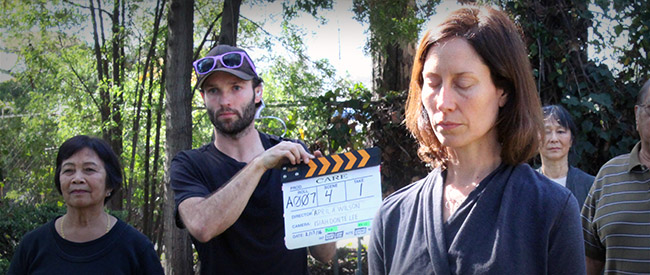
The 2016 Project Involve shorts are set to premiere as part of the upcoming LA Film Festival, held June 1-9 at the ArcLight Cinemas in Hollywood and Culver City.
It’ll mark the end of a long, eventful journey for our PI filmmakers; so with the debut of their shorts just over the horizon, we reached out to a few of this year’s participants to grill them about their experience and how their films are developing—as well as what’s next.
Film Independent spoke to the following Project Involve participants:
- Sue-Ellen Chitunya, producer of Get the Life, the story of a transgender teenager facing an unwanted pregnancy.
- Ashley Chrisman, producer of Castor Oil, about a young teen who fantasizes about his Bible study classmate, only to have her agree to be his date to the sock-hop.
- Leon Hendrix, writer of Castor Oil.
- Oby M. Okoye, producer of Reagan, the story of a 15-year-old sex worker who escapes her East Oakland group home and learns to redefine the idea of “family.”
- Yanillys Perez, director of Firefly, the tale of a curious young girl who senses a monster may be to blame when things in her house begin to change.
- Eugene Ramos, writer of They Charge for the Sun, a sci-fi parable about a dystopian future where people live nocturnally in order to avoid the harmful rays of the sun.
- Brook Sitgraves Turner, writer of Firefly.
- April Wilson, director of Care, the story of an elderly woman in an assisted living facility who falls for another resident, despite her failing memory.
We also spoke to Kiehl’s Since 1851 President Chris Salgardo about his company’s championing of Project Involve—Kiehl’s returned once again this program’s Lead Funder of shorts. So without further ado, please enjoy this exclusive peek into how the short-film sausage actually gets made:
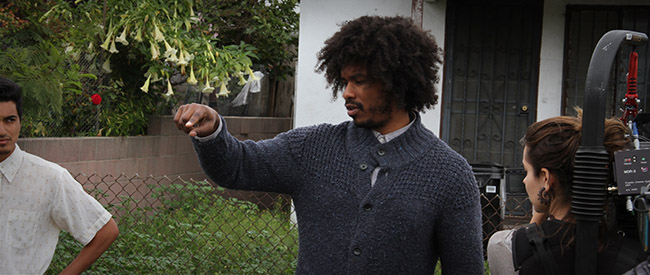
How did you learn about Project Involve?
Okoye: I learned about Film Independent’s Project Involve program from a friend and colleague who’d previously participated in Film Independent’s writing and directing labs. She’d spoken so highly of her experience with Film Independent and the relationships she’d cultivated as part of its programs, I felt compelled to apply to Project Involve and become a part of the Film Independent family.
Ramos: I learned about Project Involve when I was researching Sloan opportunities for my romantic comedy script about Isaac Newton. While on the Film Independent site, I stumbled upon the Project Involve page and thought that the program would be perfect. I submitted my application and a few months later I was asked to interview. I tanked my interview and wasn’t selected to be part of the program that year, but a few years later I decided to reapply. I was very happy to get the email saying that I would be part of this year’s group of fellows!
Salgardo: Kiehl’s is also a sponsor of the Film Independent Spirit Awards, but we wanted to do more. We wanted to help support the unique visions of a wide variety of artists. Part of our our mission statement is “to improve, in some way, the quality of the community to which it is committed.” In deciding how to best support the LA area, we wanted to focus on diversity. And we found that in Project Involve.
How was it being paired up with your fellow Project Involve filmmakers as collaborators?
Chrisman: Getting paired up was one of the most interesting elements of the program. It was kind of like speed dating! The writer and I clicked early. The directors pitched a little later in the process, and our director of photography and editors were attached last.
Chitunya: The experience of getting paired up was enlightening. It allowed me the opportunity to hone my diplomacy skills! I also learned how to create common ground with fellow collaborators while keeping in mind the big picture [goal] of producing the best possible film that we were all capable of.
Salgardo: [Project Involve] isn’t a program that just gives these talented individuals money and then sends them on their way. Instead, it connects each professional…providing access to production resources and the opportunity to network with other filmmakers. We don’t have unlimited resources at Kiehl’s, so we really try to focus our philanthropic dollars on projects that make the most difference, and I think we’ve found that with Project Involve.
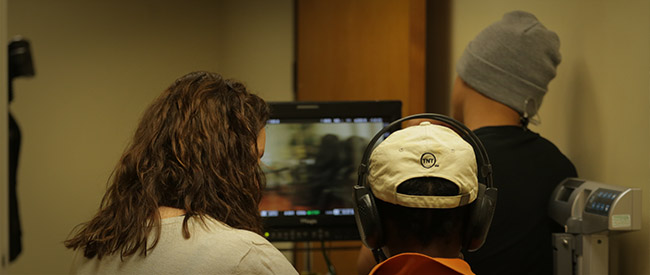
What was the first day on set like?
Ramos: The first day on set was intense. I’d never been involved on a set with such a big crew. We fell behind on our schedule and there were a lot of conversations involving the director and the producers on how to adjust considering how much we needed to accomplish by the end of the shoot.
Turner: The first day on set was exciting and stressful. It was really difficult to divorce myself from my title as “writer” and trust that the director had a clear and fitting vision for the film.
Chitunya: The first few hours on set our first day were like the first day of school, where you’re getting familiar with your surroundings and your mates. Once we were all familiar, our crew worked tireless to keep the production moving as smoothly as possible. For our exterior shots, we battled some environmental elements such as wind, cars driving up and airplanes. But overall, the first day was dandy.
What was the biggest challenge you faced during production?
Hendrix: It was difficult to take a story and characters and a world that had meant so much to me—that had really defined my understanding of family, and women, and sex for much of my life—and entrust its interpretation to others. I fought for things, I backed off, and ultimately I trusted Ashley very much to be the shepherd of the core story. She had a similar background and we’re both from Chicago and she knew the world I was playing in so I was extremely blessed to have her on the team.
Wilson: We weren’t able to lock our actors until the day before production began. As a result, I didn’t have a chance to rehearse or have the actors meet before we got to set. As the director, it was difficult because so much of the film relies on their performances and having the audience believe that they’re in love. We had a lot of shots planned but my DP and his crew did a great job moving from setup to setup and that helped give me more time to work with the actors.
Okoye: The biggest challenge was time. There didn’t seem to be enough hours in the day to get everything we needed. As a whole, I think my team was very satisfied with the production, but I think we all would’ve wanted an extra day to shoot a few more scenes or do retakes.
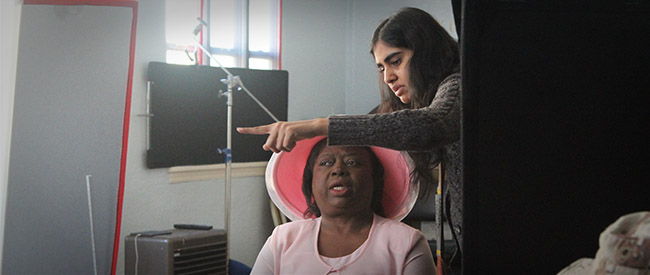
How did your project evolve once you began shooting or editing?
Perez: The idea evolved once the actors started appropriating their lines and starting to act. Also, the script changed because of many factors. Sometimes you imagine something very fantastic, but you realize on the day of the shoot that you don’t have the tools to film those things and you have to do what you can with what you have in the moment.
Turner: During the shoot I had to let go of [my] expectations entirely. Our director is big on improvisation, so we had to trust that she had a handle on the heart of the story, and that she could execute her vision in the best way possible. We’re currently editing, so this process is evolving. There’s a moment when you say, “Okay, this is the footage we have—what’s the best way to shape it?”
Salgardo: My hope for both Kiehl’s employees and customers who view these films is that they spend a little more time thinking about what’s outside their own corner of the world—even those of us who are the most concerned with others sometimes forget that there are thousands of other corners around the globe where people struggle with things that have never even crossed our minds.
Where do you hope to go from here?
Perez: I’m finishing my first feature documentary and writing my first feature narrative, Luna and Celeste. I met some great people in the program, and I’ll probably be working with some of them in the future!
Chrisman: I hope to get this film out into the world and seen at some great festivals! I hope that the film will open doors for more stories like this to be told, and for me to make more films. Next, I’m working on a feature—so I’ll definitely be calling some of the [Project Involve] fellows for help on that!
Hendrix: I’m finishing up the Fox Writer’s Intensive and writing a new feature with Film Independent support. [I’m] hoping for a staff position on a TV show this year— fingers crossed!
Ramos: I’m writing a supernatural pilot. I’m very much looking forward to working with Ruth Atkinson again. I want to use [my Project Involve short] and my pilot as samples of what I can do as a writer. I’m actually transitioning towards more genre fare from comedies and romantic comedies, because there doesn’t seem to be much of an appetite for romantic comedies these days, and writing “They Charge For The Sun” has rekindled my love of sci-fi.
Wilson: I’m writing a feature film. Hopefully it will be my feature directorial debut and I’ll be able to work with some of the amazing producers, cinematographers and editors from Project Involve.
Turner: I’m in the process of finishing a few writing samples, and hope to be staffed on a show this year.
Okoye: One of the great gifts that Project Involve gives the fellows is a mentor of their choosing. I chose the very outspoken indie producer Effie Brown. After production wrapped, I had time to meet in person with my mentor and discuss my professional goals. To my surprise, Effie was in need of an assistant and offered me the job right on the spot. This new position will give me an opportunity to work closely with someone I truly respect and can learn from. I hope to make my mark as a producer who pushes the envelope and creates content that reflects the world.
Chitunya: I look forward to collaborating with some of my fellow Project Involve mates. Next, I’m developing a feature to be shot in Zimbabwe and South Africa.
Salgardo: There will always be a strong relationship between Kiehl’s and the arts. I think one of the most powerful ways we can serve our communities is by connecting them with art that wouldn’t otherwise be available or accessible. The special thing about Project Involve is that we’re not only helping this form of art come to life for the public, but also the artist.
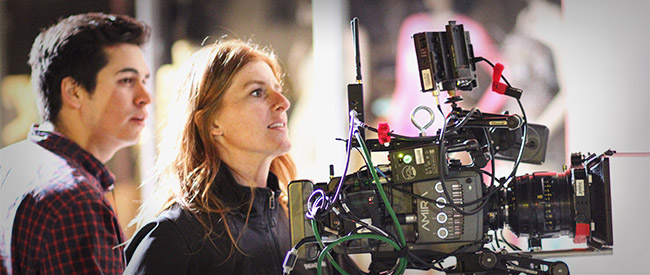
To learn more about Project Involve, including how to apply to become a part of next year’s illustrious class of up-and-coming filmmakers, click here.
For more information on additional Film Independent projects and programs, click here. To learn how to become a Member of Film Independent, click here.
For tickets to the LA Film Festival, just click here. For more info about this year’s Festival—including a full lineup of films, panels and special events—click here.
